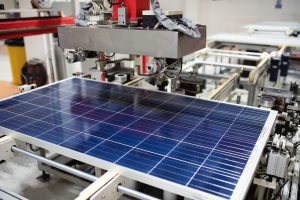The China-U.S. strategic competition took a dramatic turn last week, as the Biden administration fired a fresh salvo in the form of substantial tariff hikes on a range of Chinese imports critical to the clean energy transition. The move, which targets electric vehicles (EVs), solar cells, lithium-ion batteries, and critical minerals, came as a surprise to many, given the seemingly amicable climate discussions between the newly appointed U.S. and Chinese climate envoys, John Podesta and Liu Zhenmin, just days earlier.
While the timing of Biden’s decision to impose steep tariffs on Chinese EVs and other clean energy imports may seem politically motivated, given the upcoming U.S. elections, he had compelling reasons to act. As Nobel Prize-winning economist Paul Krugman argued, the Biden administration’s ability to secure substantial subsidies for renewable energy through the Inflation Reduction Act (IRA) was contingent upon tying those subsidies to the creation of domestic manufacturing jobs. If the American public perceives that these subsidies are primarily benefiting China by creating jobs overseas instead of at home, it could jeopardize the nation’s best chance at avoiding a climate catastrophe. This consideration, Krugman asserts, far outweighs the usual arguments against tariffs.
Although the United States currently imports very few Chinese EVs, the tariffs serve as a pre-emptive measure to prevent a potential flood of cheap, subsidized Chinese vehicles from undermining the Biden administration’s efforts to foster a domestic EV industry. The 100 percent tariff on Chinese EVs, along with increased tariffs on solar cells, batteries, and critical minerals, aims to protect American jobs and businesses from what the White House perceives as unfair trade practices.
The “overcapacity” that China is being accused of refers to a situation where the country’s production capacity in certain industries – in this context, the clean energy sector – significantly exceeds both domestic demand and what the global market can absorb. This also leads to a glut of products that distorts global prices and undermines the competitiveness of foreign firms.
China’s solar panel manufacturing capacity exceeds 80 percent of global totals for all key stages, from polysilicon to modules. In 2023, China’s exports of these products reached $150 billion, a 650 percent increase from $20 billion in 2017. For EVs, China accounted for nearly 60 percent of both global production and exports in 2021; its EV industry has only expanded since. Chinese companies also supply 60-65 percent of the world’s wind turbines and 80 percent of lithium-ion battery cells.
China’s planned manufacturing capacity for batteries used in EVs and power grids from 2024-27 is about double what would be needed, and its solar manufacturing capacity is more than double the world’s installation capacity. The argument is that this overcapacity is not the result of market forces or superior efficiency but rather stems from state-driven industrial policies that create an uneven playing field. By providing extensive subsidies, tax incentives, and other forms of support to its domestic industries, the Chinese government enables its companies to maintain or expand production capacity without facing the same economic pressures as their foreign counterparts.
But Beijing has strongly refuted this charge of overcapacity, arguing that its success in industries such as EVs, solar panels, and batteries is the result of technological innovation, a well-established supply chain, and fair market competition, rather than unfair trade practices. Chinese Foreign Ministry spokesperson Wang Wenbin accused the U.S. of applying “double standards” by justifying its own subsidies and exports, while labelling other countries’ subsidies as “unfair” and accusing others of exporting “overcapacity.”
Wang pointed out that both the U.S. and Europe provide significant subsidies to their green technology industries. The U.S. has enacted the IRA, which offers approximately $369 billion in tax incentives and subsidies for clean energy industries, including EVs. The CHIPS and Science Act also provides $52.7 billion for American semiconductor research, development, manufacturing, and workforce development. Germany’s Volkswagen and U.S. EV leader Tesla also benefit from subsidies. Chinese experts argue that the U.S. complaints about China’s new energy products contradict the economic principle of comparative advantage, and view the U.S. accusations as an excuse to impose tariffs on Chinese clean energy products, in an attempt to protect its own industries and maintain global market dominance.
Based on China’s past reactions to U.S. tariffs and its stance on the current situation, it is probable that Beijing will impose retaliatory tariffs on U.S. goods, targeting key industries and politically sensitive sectors to exert pressure on the Biden administration. Additionally, China is likely to file a complaint with the World Trade Organization (WTO), arguing that the U.S. tariffs violate international trade rules and unfairly discriminate against Chinese products.
It is also worth noting that China itself has a history of imposing tariffs and other trade barriers to protect its domestic market and industries. The U.S. is now employing similar tactics to shield its own interests in the face of China’s growing dominance in the global clean energy sector. While this approach may limit choice among American consumers and potentially hinder the adoption of EVs in the short term, the Biden administration believes it is necessary to secure the long-term viability of the U.S. auto industry and promote the growth of domestic clean energy manufacturing capabilities.
The outcome, alas, is likely to be a more protectionist world economy.

































